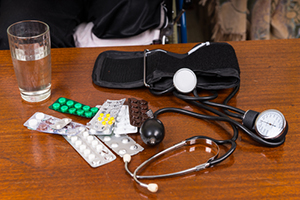 You probably know that blood pressure medications come with a long list of side effects. Some are mild but others are deadly.
You probably know that blood pressure medications come with a long list of side effects. Some are mild but others are deadly.
A new study published in the New England Journal of Medicine revealed just how serious a certain type of blood pressure medications for specific type of high blood pressure are.
And the results shocked even the most pessimistic doctors.
Patients with big fluctuations are most often seriously over-medicated by doctors because fluctuating high blood pressure poses even higher risk than steady hypertension.
If your pressure is consistently high, it will damage your blood vessels over time, but if it varies with frequent spikes, you are at serious risk of a stroke.
However, when the scientists analyzed the data of 8,092 hypertensive adults, they discovered that heavily medicated people with fluctuating readings were extremely likely to suffer from severe side effects like fainting.
Moreover, for patients with high variations, a heavy drug regime did not reduce their risk of cardiovascular disease at all.
When doctors gave them enough drugs to drop their readings to 120 mmHg, they suffered even more severe side effects.
Of these, 48 percent were receiving cardiovascular drugs, of which the most common were beta-blockers, calcium channel blockers, ACE inhibitors, and diuretics.
In addition, the more of these drugs they took, the more likely they were to faint repeatedly.
Your body regulates its blood pressure carefully and allows it to fluctuate naturally based on your physical movements.
Blood pressure medicine interferes with this process by preventing your body from raising its blood pressure, even when it is basically necessary to do so. Like when standing up or walking briskly.
Sometimes, though, different sources of stress cause acute and/or chronic blood pressure spikes that can be very dangerous if not managed.
So what’s a person to do if they have dangerously high or fluctuating blood pressure when the “treatment” (drugs) is worse than the problem?

 Overcoming IBD
Overcoming IBD Multiple Sclerosis
Multiple Sclerosis Banishing Bronchitis
Banishing Bronchitis Gum Disease Gone
Gum Disease Gone Overcoming Onychomycosis
Overcoming Onychomycosis Neuropathy No More
Neuropathy No More The Prostate Protocol
The Prostate Protocol Brain Booster
Brain Booster
 Ironbound
Ironbound
 Solution for Shingles
Solution for Shingles
 The Bone Density Solution
The Bone Density Solution
 The Ultimate Healing Protocol
The Ultimate Healing Protocol
 The Parkinson's Protocol
The Parkinson's Protocol
 The Chronic Kidney Disease Solution
The Chronic Kidney Disease Solution
 Overthrowing Anxiety
Overthrowing Anxiety The Fatty Liver Solution
The Fatty Liver Solution The Hypothyroidism Solution
The Hypothyroidism Solution
 The End of Gout
The End of Gout The Blood Pressure Program
The Blood Pressure Program
 The Oxigized Cholesterol Strategy
The Oxigized Cholesterol Strategy
 Stop Snoring And Sleep Apnea Program
Stop Snoring And Sleep Apnea Program
 The Arthritis Strategy
The Arthritis Strategy The Vertigo & Dizziness Program
The Vertigo & Dizziness Program The 3-Step Diabetes Strategy
The 3-Step Diabetes Strategy Hemorrhoids Healing Protocol
Hemorrhoids Healing Protocol The Erectile Dysfunction Master
The Erectile Dysfunction Master Weight Loss Breeze
Weight Loss Breeze The IBS Program
The IBS Program The Insomnia Program
The Insomnia Program The Migraine and Headache Program
The Migraine and Headache Program The Neck Pain Solution
The Neck Pain Solution The Menopause Solution
The Menopause Solution The Ejaculation Master
The Ejaculation Master The TMJ Solution
The TMJ Solution The Acid Reflux Solution
The Acid Reflux Solution The Fibromyalgia Solution
The Fibromyalgia Solution The Psoriasis Strategy
The Psoriasis Strategy